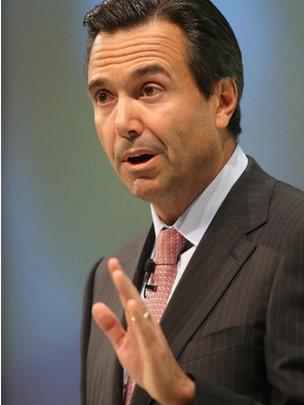Fitting brakes to the pay merry-go-round
- Published

Critics argue that the boardroom pay game means no-one ever loses
Business Secretary Vince Cable's proposals to tackle excessive boardroom pay follow mounting anger over the bonus culture and its perceived rewards for failure.
A campaign for reform gained traction throughout 2011, as unions, MPs, protesters and even some within the corporate elite argued that enough was enough.
And when Prime Minister David Cameron spoke earlier this month about a "failure" of the market to deal with an issue that made "people's blood boil", the stage was set for government intervention.
But having identified a problem (though not everyone agrees there is a problem, of course), the hard part was what to do about it.
Mr Cable told the Commons he wanted remuneration packages to be more transparent, powers for shareholders to block some payments, and a more diverse mix of people on remuneration committees in order to break the old boys' network.
Much work still needs to be done on the proposals before they are ready to go before Parliament. Or, in other words, the real challenge to change begins now.
Because, while reforming executive pay sounds OK in theory, even those who support change - including many in the investment community - are cautious about what can work in practice.
Mr Cable appeared to recognise the hurdles when he warned the Commons that there was "no magic bullet".
The first problem is that there is not even agreement on the best figures to use to demonstrate that there is an issue.
Much-quoted numbers by Incomes Data Services that FTSE 100 chief executives enjoyed an average 49% increase in pay in 2010 tell only a very partial story, say critics.
They argue that this average figure is influenced by a few exceptional incentive packages, largely among some foreign London-listed mining companies.
'Not representative'
Remuneration expert Oliver Overstall, a partner at consultants FIT, believes a more accurate measure would come from using a median, or typical, figure.
On this basis, the increase in FTSE 100 executive remuneration is more like 16%, he says. Others have put it at about 13%.
He is not suggesting that 16% is not high or that there is no issue for debate. But that we should, perhaps, take a more moderate approach.
"The figures often quoted are not representative, and often used to blow everything out of proportion," Mr Overstall says.
"In the world as a whole, we in [the UK] are not excessive," he adds. "Our corporate governance standards are good and I don't think we should do ourselves down."
Despite some high-profile examples of pay excess, the broader picture may reveal a different story.
Research published last September by corporate governance adviser Manifest and consultants MM&K found that among 665 companies studied, the median rise in remuneration was about 2%-3% in 2010.
The biggest increase was among FTSE 100 chief executives, at 14%, a rise driven primarily by the vesting of long term incentive packages rather than a rise in basic pay.
Manifest's head of research, Alan Brett, echoes the comments from Mr Overstall, saying that this does not mean excessive pay and rewards for failure should not be curtailed.
But he believes many lobbyists for change "conflate and confuse the problems of investment banking pay and Plc director pay".
And since several examples of excess in investment banking are at US-based operations or US offshoots in London, the UK government may struggle to find a solution, he said.
Deborah Hargreaves, who led the High Pay Commission study, agrees that there are a few extortionate packages pulling up the average.
But she said this should not disguise the fact that FTSE 100 pay had soared generally over many years, and that double-digit annual increases had become the norm.
"And the practice is spreading to FTSE 250 companies. There's a ratchet effect. What's more, remuneration advisers are forever coming up with new benchmarking exercises that ensure rises will happen across sectors," she said.
'Crony capitalism'
Critics blame companies' remuneration committees, whose job is to set out pay structures deemed appropriate to retain executives and support strategic aims.
These committees are full of the same old faces, sitting on each others' boards and waiving through fat-cat deals. Deputy Prime Minister Nick Clegg calls it "crony capitalism".
But the statistics don't bear this out. Manifest found that only 52 - or 5% - of FTSE 100 directors sat on another FTSE 100 board as a non-executive. Of these, just 20 sit on the remuneration committees of these other companies.
Breakdown of a chief executive's pay
RBS chief executive Stephen Hester's pay 2010-
£1.2m SalaryNegotiated between Stephen Hester, his advisers and RBS
-
£2m BonusPaid in shares. Specific criteria not disclosed for commercial reasons, but based on factors such as share price, lending targets, risk and control.
-
£4.5m Long term incentive planMaximum of £4.5m in shares that Hester has agreed not to cash until May 2015 at the earliest.
Based on multiple targets including benchmarking against 20 international banks, share price, profits. Each measure is given various percentage weightings.*
Source: RBS
Mr Brett said: "There was a problem (of crony capitalism) in the 1980s, but then new regulations came in and the problem began to go away.
"Today, everyone wants new regulations about boardroom appointments. But that particular battle has already been won."
Ms Hargreaves is cautious about Manifest's report, which she said concentrated only on serving executive directors.
Her complaint is that FTSE 100 remuneration committees are also brimming with retired executive directors now doing part-time jobs as non-executives. They are part of a clique.
"They are people who were in the system and know the system," she said. "They were part of the rarefied atmosphere where £2m bonuses were the rule."
She wants more diversity in the boardroom, including the appointment of employee representatives on remuneration committees.
"Having an employee sit on the remuneration committee would help break open the closed shop, put some grit in the wheels," she said.
'Tough stance'
For many critics the real issue is not necessarily high pay but the sheer complexity of remuneration agreements and packages that allow rewards for failure.
It's a view shared by the National Association of Pension Funds, which represents the institutional shareholders which own the bulk of FTSE 100 companies.
David Paterson, the NAPF's head of corporate governance, urges shareholders to take a "tough stance" and "oppose the re-election of directors who sanction inappropriate reward policies".

Lloyds chief executive Antonio Horta-Osorio has said he will not take an annual bonus for 2011
Trouble is, sifting the good from the bad is currently not easy. And when even the professionals have trouble deciphering pay packages, you know there must be a problem.
"Boardroom pay needs to be brought under control and held up to the light," said Mr Robertson. "Too often we find pay structures are opaque and complicated, making it difficult for shareholders to test them."
One suggestion to improve transparency is to publish the ratio of earnings between senior executives and a typical employee.
But even such a seemingly simple idea like ratio reporting could give a misleading impression.
A company paying relatively high wages across the board - an investment bank, for example - would get a "good" score.
Another company - a supermarket, perhaps - employing tens of thousands of people but paying lower wages, would get a "bad" score.
For Liz Murrall, director of corporate governance and reporting at the Investment Management Association (IMA), it is not transparency that's the problem - we already have lengthy remuneration reports in annual reports - but clarity.
A basic pay award, plus a simple bonus (mostly shares) based on simple metrics and stretched out over many years, would be better at ensuring pay was linked to performance and a successful strategy.
Simplicity would also help take some heat out of the argument, she says.
"Performance structures are frequently over too short a time frame. You've got to have remuneration targets that reward executives for meeting long-term strategy targets," she said.
There have been examples of companies, such as Royal Bank of Scotland, which ramped up growth through a frenzy of acquisitions.
Simplicity
Executives banked rewards based on short-term growth and jumps in the share prices. But many deals and strategies proved utterly misguided in the longer term.
Ms Murrall said: "Directors are often incentivised to maximise share price or earnings in a short time frame at a cost to the company's long-term viability.
"Even long-term incentive plans rarely extend beyond three years."
It is not helped that the tenure of a FTSE chief executive tends to be only five to six years.
"It is important that incentive structures are simplified and that there is a closer alignment of pay and performance over the long term," Ms Murrall said.
"The time horizons over which management is incentivised should be aligned with the company's strategy and cycle so that, for example, executives could have to hold shares after they have retired or left the company."
But despite agitating for change, big shareholders are reluctant to see their powers extended to overruling remuneration agreements.
Currently, at annual meetings, shareholder votes on pay deals are not binding. A big "no" vote still comes with moral authority and power to embarrass.
But companies can, and do, ignore a "no" vote. Mr Cable wants that changed.
"The government's thinking around a binding vote is interesting but we need more detail on how it would work before we could give it our support," said Mr Robertson.
"Shareholders already have a non-binding vote on pay policy, and it is very rare for a board to lose that vote."
Binding votes could potentially destabilise a company and cut across contractual agreements that have been agreed with executives.
Ms Murrall said: "When a chief executive joins a company, they do so on the basis of agreed terms. Is it the job of shareholders to come along and overturn these?"
Mr Cable told the Commons on Monday that despite his proposals, it was not the job of government to micro-manage companies.
Well, shareholders feel the same way, especially as they are not a not a heterogeneous bunch with the same vested interests.
"Fund managers, even within the same company, have different interests. Some are "long" on a company and others take "short" positions," Ms Murrall said.
The High Pay Commission agrees that introducing binding votes is problematic. For instance, many hedge funds and other speculators just do not care about annual remuneration agreements.
"They can hold shares for just days, even minutes," said Ms Hargreaves. "Corporate governance is simply not an issue for them."
Mr Cable has won many plaudits for being prepared to tackle an issue that has outraged much of the population.
But balancing the conflicting mix of data and issues in one set of regulations won't be easy. Or, as FIT partner Mr Overstall put it: "With executive pay, one size definitely does not fit all."
- Published13 January 2012
- Published8 January 2012
- Published22 November 2011